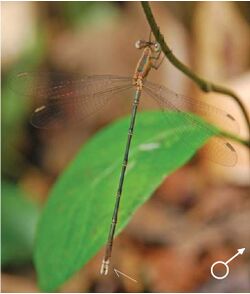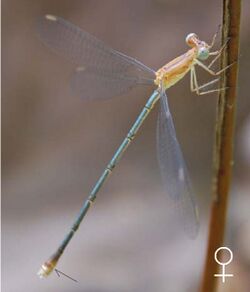Biology:Lestes viridulus
| Lestes viridulus | |
|---|---|

| |
| Male | |

| |
| Female | |
| Scientific classification | |
| Domain: | Eukaryota |
| Kingdom: | Animalia |
| Phylum: | Arthropoda |
| Class: | Insecta |
| Order: | Odonata |
| Suborder: | Zygoptera |
| Family: | Lestidae |
| Genus: | Lestes |
| Species: | L. viridulus
|
| Binomial name | |
| Lestes viridulus Rambur, 1842
| |
Lestes viridulus,[2][1] the emerald-striped spreadwing,[3][4] is a damselfly species in the family Lestidae, the spreadwings. It is native to Bangladesh, India , and Thailand.[1][5]
Description and habitat
It is a medium sized damselfly with brown-capped yellow eyes. Its thorax is khaki brown, paling to creamy white on the sides. The dorsum of the thorax has two very narrow metallic green stripes, running closely parallel to the mid-dorsal carina. Wings are transparent with pale brown pterostigma. Abdomen is yellowish brown on the sides with metallic-green dorsal stripes up to segment 8. Segment 9 has a dark dorsal mark on basal half. The remaining half of segment 9, segment 10 and the anal appendages are pale yellow. Female is similar to the male. It can be easily distinguished from all others species of this genus by its uniform pale brown color and the pair of dorsal thoracic metallic green stripes of uniform width.[6]
It is commonly found among dry grass during the summer season enjoying camouflage in the plains.[6][7][8][3][4]
See also
- List of odonates of India
- List of odonata of Kerala
References
- ↑ 1.0 1.1 1.2 Dow, R.A. (2010). "Lestes viridulus". IUCN Red List of Threatened Species 2010: e.T167318A6328220. doi:10.2305/IUCN.UK.2010-4.RLTS.T167318A6328220.en. https://www.iucnredlist.org/species/167318/6328220. Retrieved 20 November 2021.
- ↑ "World Odonata List". University of Puget Sound. https://www.pugetsound.edu/academics/academic-resources/slater-museum/biodiversity-resources/dragonflies/world-odonata-list2/.
- ↑ 3.0 3.1 "Lestes viridulus Rambur, 1842". India Biodiversity Portal. http://indiabiodiversity.org/species/show/256202.
- ↑ 4.0 4.1 "Lestes viridulus Rambur, 1842". Odonata of India, v. 1.00. Indian Foundation for Butterflies. http://www.indianodonata.org/#!/sp/219/Lestes-viridulus.
- ↑ K.A., Subramanian; K.G., Emiliyamma; R., Babu; C., Radhakrishnan; S.S., Talmale (2018). Atlas of Odonata (Insecta) of the Western Ghats, India. Zoological Survey of India. pp. 47–48. ISBN 9788181714954.
- ↑ 6.0 6.1 C FC Lt. Fraser (1933). The Fauna of British India, including Ceylon and Burma, Odonata Vol. I. Red Lion Court, Fleet Street, London: Taylor and Francis. pp. 45-46. https://archive.org/details/FraserOdonata1.
- ↑ C FC Lt. Fraser (1924). A Survey of the Odonate (Dragonfly) Fauna of Western India with Special Remarks on the Genera Macromia and Idionyx and Descriptions of Thirty New Species. Zoological Survey of India. Volumes (Records). pp. 487. http://faunaofindia.nic.in/PDFVolumes/records/026/05/0423-0522.pdf.
- ↑ Subramanian, K. A. (2005). Dragonflies and Damselflies of Peninsular India - A Field Guide. http://www.ias.ac.in/Publications/Overview/Dragonflies.
External links
Wikidata ☰ Q7292497 entry
 |


